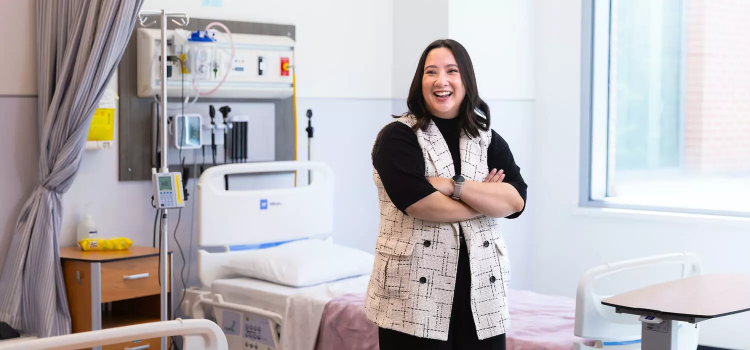Note to readers: This article contains information about child death and illness and may be emotionally challenging for those who have experienced this.
For Dr. Kate Wong, crossing the convocation stage to officially receive her PhD in nursing from the University of Calgary is more than an academic milestone.
It represents a desire to ensure people hear the voices of children with life-shortening illnesses.

In her research, Kate Wong used art-based interview methods to help children express their emotions. Photo Credit: Riley Brandt, University of Calgary
Her doctoral research delves into the unique and often overlooked perspectives of children in paediatric palliative care. This focus stems from 13 years of working in the field at Rotary Flames House before returning to UCalgary for her graduate studies.
"I have a lot of questions around how children experience palliative and end-of-life care that formed through my nursing practice, and it's a topic that hasn't been studied very much," says Wong, BN'12, PhD'25.
Giving voice through art
To understand these experiences, Wong used art-based interview methods. She found that art provided a powerful medium for children who may lack the vocabulary or comfort to express complex emotions and thoughts verbally.
Wong says she looked at, "how artwork can help us express things that are either difficult to say or things that are hard for all of us to talk about, because art has always been a way for us to talk about death and dying."
This approach challenged adult assumptions about what children understand and experience.
One memorable instance involved a sibling who drew her deceased sister's bedroom in heaven, complete with a waterslide, opening a conversation that revealed concerns different from what adults had anticipated.
Wong's work underscores that children, regardless of how they communicate, have something to say about their experiences.
The journey to her PhD included a transfer from a master's program, a decision affirmed by early validation of her research ideas and the awarding of an Eyes High Doctoral Recruitment Scholarship and a Social Sciences and Humanities Research Council (SSHRC) Doctoral Fellowship. The support of Wong's supervisor, Dr. Nancy Moules, was instrumental in her decision to transfer to the doctoral program.
Wong says that validated "that children's experiences of life-shortening illnesses, the topic I was studying, was something that people thought was important and worthy of funding and attention in a society that struggles to acknowledge that children die."
A legacy of contribution
Wong's commitment to UCalgary extends far beyond her academic pursuits.
The third-generation grad who conferred her PhD in February, and convocates in June is the first woman in her family to earn a doctorate.
"I had always thought about UCalgary in terms of where I would go for my undergraduate," Wong says, noting that her grandfather earned an education degree and her father a law degree here. "When it came time to decide, it wasn't much of a question of where I would go."
Wong has a long history of volunteerism, including serving as president of the UCalgary Alumni Association from 2023 to 2025.
"If UCalgary is home, then I want to contribute to my home," Wong says.
Reflecting on her proudest moments from graduate school, Wong cites "being hired as an assistant professor. That happened before I defended my thesis, so that was a huge vote of confidence from the Faculty of Nursing."
Defending her thesis before a committee, many of whom she'd known for more than a decade, was another significant milestone. As an assistant professor in the Faculty of Nursing, Wong continues to integrate her research into her teaching.
"There is something very special and very important about working with children who die and it changes your perspective on everything," says Wong. "I'm not too worried about getting older or grey hairs because I know not everyone gets to age."
Looking forward, offering advice
Wong believes the health-care system can better support ill children. This could be achieved by practitioners "slowing down," recognizing that hesitations and silences might be invitations for deeper conversation and providing different opportunities for expression through play, art or storytelling.
"We need to recognize that children are stakeholders with unique perspectives and needs when we make decisions about their care or conduct child health research," Wong says.
For new graduates, especially in nursing, Wong offers this advice: "Make sure that you take care of yourself before you take care of other people, and advocate for yourself."
She also encourages exploration and adds, "In nursing, there is something for everybody. If you wind up somewhere that you're not happy to begin with, try something else."
As Wong prepares for convocation, her journey exemplifies a deep commitment to compassionate care, rigorous research and unwavering service to the UCalgary community, leaving an indelible mark on both the institution and the lives she touches.












